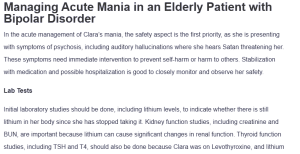Managing Acute Mania in an Elderly Patient with Bipolar Disorder
In the acute management of Clara’s mania, the safety aspect is the first priority, as she is presenting with symptoms of psychosis, including auditory hallucinations where she hears Satan threatening her. These symptoms need immediate intervention to prevent self-harm or harm to others. Stabilization with medication and possible hospitalization is good to closely monitor and observe her safety.
Lab Tests
Initial laboratory studies should be done, including lithium levels, to indicate whether there is still lithium in her body since she has stopped taking it. Kidney function studies, including creatinine and BUN, are important because lithium can cause significant changes in renal function. Thyroid function studies, including TSH and T4, should also be done because Clara was on Levothyroxine, and lithium often affects the thyroid gland. Electrolytes should also be studied because imbalances are more common when Clara takes her diuretics.
Medication for Acute Mania
Starting Clara on an antipsychotic, such as Olanzapine or Risperidone, would likely quickly reduce her psychotic symptoms and stabilize her mood. Although generally effective, these medications have potential side effects such as weight gain, sedation, and metabolic concerns that need to be regularly monitored to adjust treatment as needed (Zhang et al., 2022).
Lithium Dosage
Restarting lithium at a low dose, such as 300 mg twice daily, is prudent, with gradual increases to achieve therapeutic levels (0.6-1.2 mEq/L). This approach will go a long way in preventing toxicity, especially given her advanced age and potential renal compromise.
Patient Education
Clara should be educated on the importance of medication compliance to prevent recurrent manic episodes, adequate hydration, and stable salt intake to minimize fluctuations of lithium. She should also be educated on the signs of lithium toxicity, including tremors and confusion, and when to seek immediate assistance if they occur. Additionally, Clara’s family should be educated about these symptoms so that they may provide support to her in her compliance and early detection of changes. Regular follow-ups for laboratory monitoring are indicated to ensure her safety and the effectiveness of medications (Hedya & Swoboda, 2023).
References
Hedya, S. A., & Swoboda, H. D. (2023, June 26). Lithium toxicity. Nih.gov; StatPearls Publishing. https://www.ncbi.nlm.nih.gov/books/NBK499992/
Zhang, J. F., Yoon, J., & Gokhale, V. (2022). Acute-onset psychosis following prolonged hospitalization for COVID-19 pneumonia. American Journal of Case Reports, 23(78). https://doi.org/10.12659/ajcr.936028
ORDER A PLAGIARISM-FREE PAPER HERE
We’ll write everything from scratch
Question 
Discussion board—Managing acute mania
SITUATION: Seventy-three-year-old Clara presents to the outpatient clinic today in an acute manic episode. She has a 30-year history of bipolar disorder. Over the past two weeks, she has made numerous contributions to the Christian Evangelical Network (spending over $10,000.00). She has been going to bridge parties and talks incessantly during the games to the point that members have begun to avoid the bridge club. Her husband reports she has begun numerous projects, but has failed to complete anything, including knitting, crewel work, oil-painting, and decorating the house. Additionally, she has been staying up at nights to wax the hardwood floors and clean out cabinets. Today, she appears tired, unkempt, and she is irritable during the interview. She says she is hearing Satan talking to her and she is afraid he is going to kill her. She has been successfully treated with Lithium over the last 15 years, but stopped taking her Lithium several months ago. Current medications include: Lisinopril HCTZ 50-12.5 1 tablet PO daily; Ibuprofen 300 mg PO BID for arthritis; Levothyroxine 50 mcg daily; Cymbalta 30 mg PO BID; and multivitamins.

Managing Acute Mania in an Elderly Patient with Bipolar Disorder
- What is priority #1 for this patient?
- What lab tests are required?
- What would you prescribe for the acute mania and why? What are the potential side effects of these medications?
- You have decided to start her back on Lithium. What would be the correct dosage and why?
- What patient teaching is required for the medication treatment you would prescribe?